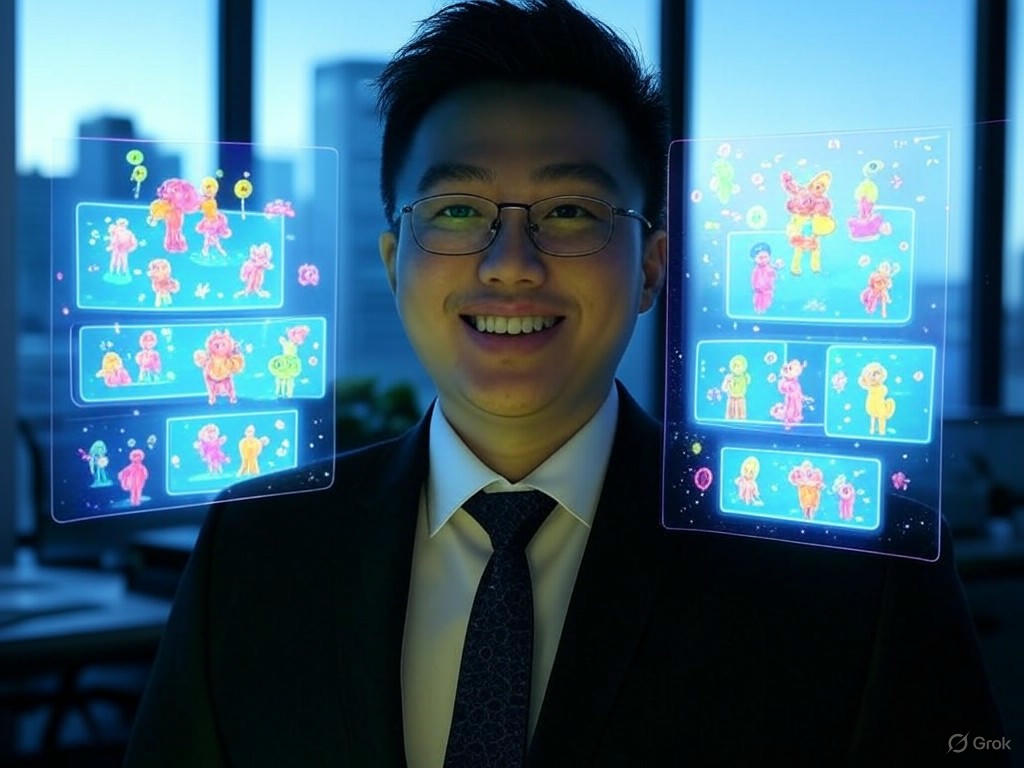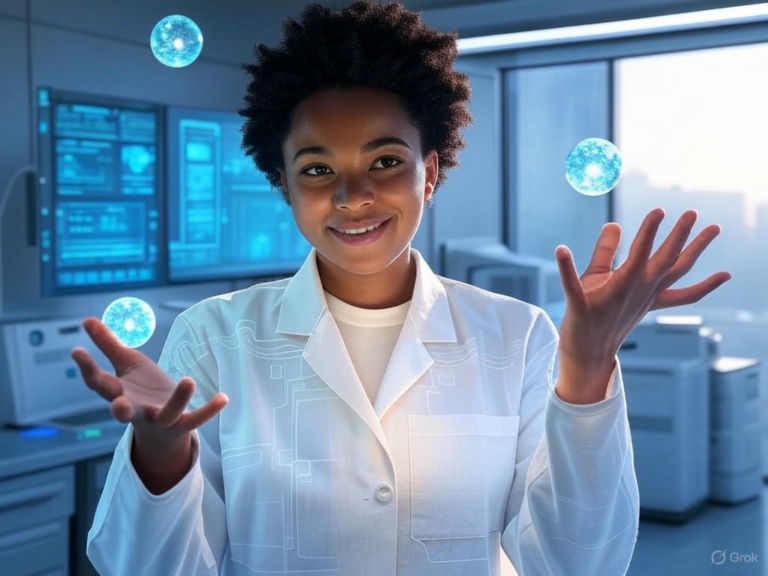
Facebook AI: Could It Destroy the Ad Ecosystem?
Facebook AI’s Radical Vision: The End of Advertising as We Know It?
Imagine a world where setting up an ad campaign is as simple as stating your goal and linking your bank account—Facebook AI is making that a reality. In a recent chat with Stratechery’s Ben Thompson, Mark Zuckerberg laid out Meta’s blueprint for an AI-driven ad system that could flip the entire industry on its head. This isn’t just talk; it’s a plan that might wipe out traditional roles in creative work, targeting, and even measurement, leaving many in the ad world wondering if their jobs are at risk.
Nilay Patel from The Verge put it bluntly, suggesting Zuckerberg’s strategy could “more or less eliminate the entire advertising ecosystem, from creative on down.” It’s a bold move, backed by Meta’s massive resources, and it raises real questions about the future of digital marketing. With Facebook AI already showing early successes, advertisers are starting to see how this technology could streamline processes or spark a full-blown disruption.
Facebook AI in Zuckerberg’s Vision: Connect, Pay, and Watch It Work
Zuckerberg didn’t mince words when he described this future: “We’re going to get to a point where you’re a business, you come to us, you tell us what your objective is, you connect to your bank account, you don’t need any creative, you don’t need any targeting demographic, you don’t need any measurement, except to be able to read the results that we spit out.” This paints a picture of Facebook AI handling the heavy lifting, from crafting ads to fine-tuning who sees them and how well they’re performing.
For small businesses, this sounds liberating—no more hiring agencies or fiddling with tools. But for pros in the field, it’s a wake-up call. Take a moment to think: if Facebook AI can automate these steps, what happens to the human touch that makes ads resonate on an emotional level?
That’s the double-edged sword here. While it promises efficiency, it’s forcing marketers to reconsider their roles in an AI-powered landscape.
The Power Behind Facebook AI: Meta’s Financial and Technological Edge
Meta’s not just dreaming big; they’re backed by numbers that turn heads. In Q1 2025, the company raked in $42.3 billion in revenue, with net income soaring 35% to $16.7 billion—more than what Publicis, the world’s largest ad holding company, made in a full year. This financial muscle means Facebook AI initiatives aren’t pie-in-the-sky; they’re actively reshaping how ads work.
With this kind of investment, it’s easy to see why Facebook AI could dominate. Advertisers using tools like Generative Ads Recommendation on Facebook Reels have already seen up to a 5% boost in conversions, proving that these systems deliver real results right now. If you’re in marketing, this is a signal to start experimenting with AI before it leaves you behind.
How Facebook AI Is Transforming Ad Tech Today
Generative AI Tools Driving Early Wins
Facebook AI isn’t waiting for the future—it’s here with tools like Generative Ads Recommendation, which has helped advertisers boost conversions by up to 5% on Reels. Back in February 2025, Meta stepped up transparency for ads touched by generative AI, a smart move as these features become standard. This shows how Facebook AI is evolving to make ad creation faster and more effective, potentially cutting out the need for external creative teams.
Picture a small e-commerce shop that used to spend weeks on ad designs; now, they can generate polished content in minutes. It’s a game-changer, but it also highlights the risk: if AI keeps improving, will human creatives still have a seat at the table?
AI Optimization: The Backbone of Facebook AI Ads
Meta’s Advantage+ campaigns are a prime example of Facebook AI in action, automatically scouting the best audiences and tweaking budgets on the fly. By diving into user behavior and performance data, these tools outshine manual efforts, helping advertisers hit their marks without the guesswork. And it’s not stopping there—generative AI can even refine ad elements in real-time, making campaigns smarter with every run.
This level of automation raises an intriguing question: if Facebook AI handles the details, what new skills will marketers need to stay relevant? Perhaps focusing on strategy over execution could be the key.
Dynamic Ads and Personalized Experiences
In 2025, Facebook AI has rolled out dynamic content for ads, including AR experiences and 360-degree videos that adapt to each user. Upload a few assets once, and the AI does the rest, tailoring captions, media, and placements for maximum impact. Industry experts note that this personalization draws from machine learning insights into user habits, creating ads that feel custom-made.
Think about how this could play out for a brand like a fashion retailer—ads that show products based on what you’ve browsed before. It’s powerful, yet it underscores the potential threat to traditional media planners who once orchestrated these details manually.
Is the Ad World on the Brink Because of Facebook AI?
The Allure of ‘Infinite Creative’
Nilay Patel calls it “infinite creative,” where Facebook AI churns out endless ad variations perfectly matched to users. This goes beyond tweaks; it’s a total overhaul of how ads are made, potentially sidelining the creative agencies that have shaped branding for years. For marketers, this means weighing the efficiency gains against the loss of that spark only humans bring.
Could this really wipe out jobs? It’s possible, as AI scales what used to take teams of people. But let’s not forget, the best ads often mix data with intuition—what if Facebook AI becomes the tool that enhances, rather than replaces, human ideas?
Roles at Risk from Facebook AI Advances
Several areas look vulnerable as Facebook AI takes over. Creative development might shrink, with AI generating content on demand. Media planning and buying could fade if the platform automates targeting, and performance measurement might make third-party tools obsolete.
- Creative development: AI could handle designs, leaving strategists to focus on bigger ideas.
- Media planning: No more manual audience hunts when Facebook AI optimizes placements.
- Performance measurement: Built-in analytics might render external services unnecessary.
- Campaign management: Real-time tweaks by AI could reduce the need for ongoing oversight.
If you’re in these fields, adapting means learning to guide AI rather than do it all yourself. It’s a shift, but one that could lead to more innovative work.
Current Strengths of Facebook AI in Advertising
Revolutionizing with AI-Driven Dynamic Ads
Facebook AI‘s dynamic ads are already transforming campaigns by automating optimizations based on user data. This means ads that adapt in real-time to viewer interests, saving time and boosting results without heavy lifting from advertisers. For instance, a travel company could see their promotions automatically highlight deals based on past searches, making every interaction count.
It’s no wonder businesses are reporting higher engagement; Facebook AI turns data into actionable insights, helping marketers make smarter decisions on the fly.
Scaling Personalization with Facebook AI
One standout feature is how Facebook AI delivers personalized content to millions, adjusting ads to show the most relevant options for each user. This level of tailoring improves conversion rates and builds stronger connections, something traditional methods struggle to match at scale. Consider a user scrolling through their feed—Facebook AI ensures they see exactly what might catch their eye, turning casual browsers into loyal customers.
For brands, this is a golden opportunity, but it also challenges them to maintain authenticity amid all that automation.
What’s Next for Facebook AI and Advertising?
Using Facebook AI as a Competitive Tool
Even with the disruptions, Facebook AI is making platforms like Facebook more valuable in 2025, reaching over 194 million users in the U.S. alone. Brands that harness this technology for dynamic content are gaining an edge, turning AI into a secret weapon for standing out. It’s a reminder that while change is coming, there’s still plenty of opportunity for those who adapt.
Ask yourself: how can you integrate Facebook AI to enhance your strategy without losing your brand’s unique voice?
Blending Human Insight with Facebook AI Efficiency
The real winners will strike a balance, using Facebook AI for the grunt work while keeping human creativity at the core. Sure, AI can optimize budgets and generate ideas, but crafting messages that truly connect? That often needs a human touch. In a hypothetical scenario, imagine a campaign where AI drafts the ads, but a team refines them for emotional appeal—it’s a partnership that could define the next era of advertising.
This approach not only boosts performance but also ensures campaigns align with ethical standards and brand values.
Getting Ready for a Facebook AI-Dominated World
Tips for Updating Your Marketing Game
To thrive in this new landscape, start by getting familiar with Facebook AI tools and their limits. Shift your focus to skills like prompt engineering, where you guide AI to produce better results, rather than building everything from scratch. Here are a few practical steps: understand your objectives clearly, monitor AI outputs against your brand goals, and always review for accuracy.
- Dive into Facebook AI capabilities to see what fits your needs.
- Train your team on strategic oversight instead of tactical tasks.
- Use data to refine campaigns, ensuring they deliver real business outcomes.
By doing this, you’ll turn potential threats into advantages, keeping your marketing fresh and effective.
Keeping the Human Element Alive
Even as Facebook AI automates more, elements like brand strategy and ethical decisions will still need human input. The evolution isn’t about replacement; it’s about augmentation, where marketers become directors of AI-driven efforts. What do you think—could this lead to more creative freedom or just more competition?
In the end, the most successful pros will be those who embrace Facebook AI as a collaborator, not a crutch.
Wrapping Up: Evolution or Total Shake-Up?
Mark Zuckerberg’s vision with Facebook AI could be the next big evolution in advertising, or it might spark a revolution that changes everything—we’re still figuring that out. With Meta pushing forward aggressively, it’s clear this isn’t just hype; it’s happening now, and it could redefine how we approach digital marketing.
For anyone in the industry, the key is to adapt, experiment, and maybe even collaborate with AI to stay ahead. What are your thoughts on this? Share in the comments, explore our other posts on AI in marketing, or drop us a line to discuss how you can integrate these tools. Let’s keep the conversation going—your insights could help shape the future.
References
Here are the sources cited in this article:
- More About Advertising. (2025). Can Facebook’s AI Wipe Out the Entire Ad Ecosystem?
- Social Media Today. (2025). Meta Shares Ad Tips for Q1 2025 Reels and AI
- Meta Newsroom. (2025). Generative AI Transparency in Meta’s Ads Products
- Enspire for Enterprise. (2025). What’s the Future of Facebook Advertising in 2025?
- Stack Influence. (2025). Meta’s Latest AI Tools for Influencers in 2025
- M1 Project. (n.d.). AI-Driven Dynamic Ads
- YouTube. (2025). [Video]. Related Discussion on AI in Ads
- Cordelia Labs. (2025). Facebook Changes You Need to Know in 2025
Facebook AI, Meta advertising, AI advertising, ad ecosystem, Zuckerberg AI plans, digital marketing future, automated ad creation, advertising automation, social media AI, Meta AI impact





